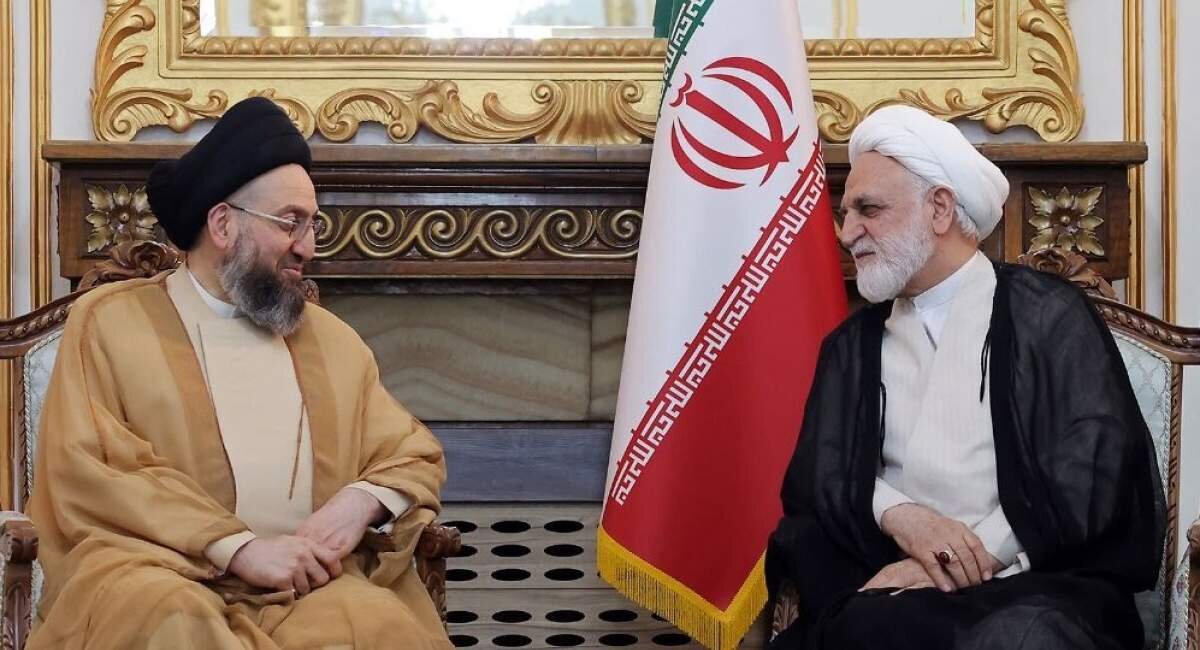No clash with neighbors unless they plot against us, Iranians tell senior Iraqi cleric

TEHRAN – Iran’s Judiciary Chief, Hojjatoleslam Gholamhossein Mohseni Eje’i, emphasized on Tuesday that the Islamic Republic maintains peaceful relations with all neighboring countries, including those occasionally aligned with Israel, but warned that Tehran will take decisive action against any nation that engages in conspiracies against Iran’s security or sovereignty.
During an official visit to Tehran, Seyyed Ammar Hakim, head of Iraq’s National Wisdom Movement, met with Iran’s Judiciary Chief, Hojjatoleslam Mohseni Eje’i. In the meeting, Eje’i highlighted the steadfast ties between Tehran and Baghdad, noting that recent regional developments demonstrate the determination of enemies opposed to a strong and advanced Islamic presence.
“Iran has never been the initiator of war and will not be, but we will never submit to the dominance of hegemonic powers or accept imposed pressures,” Eje’i said. He cited Iran’s performance during the recent 12-day conflict with Israel as proof of the country’s resilience and growing regional influence. “The aggressors assumed that this confrontation would cripple Iran, but our strength was on full display, earning respect across the world,” he added.
Eje’i emphasized that Iran’s foreign policy is guided by dialogue backed with strength. “We are willing to hear others, even adversaries, but we will never accept threats or coercive demands. Our stance is firm: no imposed war, no imposed peace.” He stressed that Iran maintains strong relations with all neighboring countries, including those occasionally aligned with adversarial powers, unless these nations engage in conspiracies against Tehran.
Hakim praised Iran’s role in the recent regional conflict, noting that the 12-day Israeli attack failed to weaken the Islamic Republic and instead reinforced its leadership in West Asia. “The Zionist regime’s aggression confirms that Iran was correct in labeling Israel a destabilizing force in the region,” Hakim said. He also highlighted the historical, cultural, and economic links between Iran and Iraq, stressing the potential to expand bilateral cooperation.
Supreme National Security Council head calls for closer ties with Iraq
Separately, Ali Larijani, Secretary of Iran’s Supreme National Security Council, held discussions with Hakim focusing on strategic cooperation and regional stability. Larijani described Iraq as a strong and friendly neighbor and called for expanding tangible, wide-ranging bilateral cooperation in light of ongoing global developments.
“The current dynamic status quo requires that Iran-Iraq cooperation be more objective and concrete,” Larijani said, highlighting joint efforts to strengthen security and economic ties. The officials also reviewed recent hostilities, including Israel’s June 13 attack on Iran, which targeted senior commanders, nuclear scientists, and civilians, and the U.S. bombings of Iranian nuclear sites on June 22.
Hakim described the Zionist regime’s aggression as a miscalculation that ultimately enhanced Iran’s power and prestige. He praised Iran’s response, including missile and drone strikes and Operation True Promise III, which led to a unilateral truce by Israel on June 24. Both sides stressed that Tehran and Baghdad are committed to coordinated security, legal, and judicial cooperation, aiming to bolster regional stability and strengthen mutual resilience against external threats.
Ammar Hakim pays tribute to the late Founder of the Islamic Republic
Hakim also visited the mausoleum of the late Imam Khomeini, founder of the Islamic Republic of Iran, on Saturday to pay his respects. During the visit, Hakim also met with Seyyed Hassan Khomeini, the grandson of the late leader.
Speaking after the visit, Hakim praised the solidarity shown by both Shia and Sunni Muslims with Iran during the recent 12-day war against Israel. He said Muslims across the region have demonstrated that “because of their deep-rooted hatred for the Zionist regime, they support any country that defends itself against Israel and resists its aggression.”
The Iraqi politician emphasized that the war had not only united the Iranian nation but also dispelled longstanding accusations of sectarianism leveled against the Islamic Republic in the wider Muslim world. “The recent conflict has proven that Iran’s stance transcends sectarian lines and has brought together Muslims of all denominations,” Hakim said.
He also pointed to Iran’s rapid recovery from the initial shock of Israel’s assault, highlighting the damage inflicted on the regime’s air defense systems and the surprise effect of Iranian missile capabilities. “Having suffered defeat in these areas, the Zionists are now attempting to create unrest inside Iran,” he warned.
Hakim described Iran as the “frontline stronghold of the Islamic world,” stressing that the security of the wider region depends on Iran’s strength in the face of Israeli aggression. “Countries across the region now understand that if Iran is weakened in this confrontation, the entire region will ultimately bear the cost,” he added.
Leave a Comment